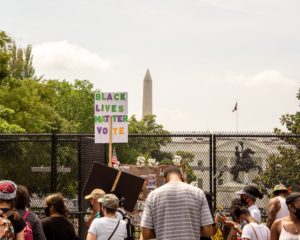Tips for Looking After Your Mental Health During Times of Political Change
Political change can be stressful, regardless of your opinions or where you stand on the political spectrum. For many people in the United States, political change (or lack of it) may lead to stress, anxiety, anger, and frustration about the current political situation and the future of the nation.
According to the American Psychological Association’s 2019 Stress in America survey, 69% of adults in the United States feel that the future of the nation is a significant source of stress, and 62% feel stressed by the current political climate. While the symptoms of stress vary depending on the individual, they often include a combination of emotional and physical reactions.
People manage stress in different ways—some healthy and some unhealthy. Sometimes, low to moderate levels of stress can push us toward political advocacy or encourage us to achieve our goals. High levels of stress, however, can detrimentally affect our emotional, mental, and physical health. According to the National Institute of Mental Health, chronic stress can lead to mental health problems such as emotional distress, substance abuse, and depression.
People with pre-existing mental health conditions or substance use disorders may be particularly vulnerable during periods of political change, according to the United States Centers for Disease Control (CDC). Mental illnesses, such as bipolar disorder, traumatic stress disorder, anxiety, and depression, affect an individual’s thoughts, feelings, and behaviors that influence their ability to function in daily life.
Signs and Symptoms of Mental Health Issues
The symptoms of mental health conditions vary depending on the person and specific mental health problem. However, some early warning signs include:
- Overeating or not eating enough
- Oversleeping or not sleeping enough
- Withdrawing from social activities
- Unexplained aches and pains
- Feelings of helplessness or hopelessness
- Substance abuse
- Difficulty concentrating or paying attention
- Fights with friends and family members
- Strong emotions or mood swings
- Suicidal thoughts
- Inability to function in daily life
Mental health challenges are common, especially during times of political change. However, mental healthcare is available. With proper treatment, people struggling with high stress, mental health struggles, and mental health disorders can very much improve their mental and emotional health.
Taking Care of Your Mental Health
Mental health is vital at every stage of life—from childhood through adolescence and adulthood. Mental health encompasses our emotional health and cognitive well-being. It affects our thoughts, feelings, and behaviors, and influences our ability to relate to others and function in everyday life.
Positive mental health allows people to build resilience, healthily manage everyday stress, maintain relationships, and work productively. On the other hand, poor mental health can lead to poor physical health, chronic stress, unhealthy coping mechanisms, and mental health issues.
Fortunately, there are numerous ways to take care of your mental health and cope with stress during political change.
Take care of your body.
Because stress can have physical effects on your overall health, it’s important to incorporate activities you enjoy into your daily routine to help you recharge, such as physical activity or spending time with family members. Make sure to prioritize healthy sleeping patterns, eating a balanced diet, and avoiding unhealthy coping mechanisms, such as substance abuse.
Unplug from social media.
If you feel overwhelmed by stress, disconnect from social media for a few days. Political upheaval is widely shared on social media, and permitting yourself to look away allows you to destress.
Find ways to help in your community.
Finding meaningful ways to become involved in your community can help you address stress. Research the issues that are most important to you, and find organizations relevant to those issues. Contact local organizations to find out how you can join their efforts.
Additionally, consider taking action on a local scale, where you may be able to see the direct impact of your efforts. Consider attending a city council meeting or a town hall meeting to share your ideas with elected officials.
Seek commonalities with others.
We come into contact with people every day whose beliefs differ from our own. When it comes to the topic of political differences, avoid heated arguments, and try to identify commonalities within different views. In some cases, different views come from the same underlying principle.
Be open to hearing the other person’s story and consider sharing your own. If you find it difficult to discuss political issues calmly and constructively, consider disengaging from the conversation.
Stay informed, but know your limits.
With constant news stories about national events, COVID-19, and politics, it’s easy to feel overwhelmed. If you’re preoccupied with the news and it’s interfering with your daily life, consider cutting back on your news intake and limiting your social media use. Some people may find it helpful to schedule a block of time to catch up on the news without checking updates throughout the day.
When checking up on the latest news, make sure to use reliable resources, like the CDC, the World Health Organization (WHO), and the federal website on the coronavirus disease.
 Empower your voice.
Empower your voice.
Regardless of where you stand on political issues, you may feel powerless if you remain distant. While you don’t have to join a political party, it can help explore ways to take action in the political community.
For example, you could participate in a peaceful protest, share unbiased information on social media, or help register people to vote. Political activism can help you feel empowered and enable you to express your thoughts more constructively.
Intentionally create safe spaces.
Political change can be especially stressful for minority communities and people of color, and it can be helpful for POC to create safe spaces during difficult times.
Additionally, remind yourself that you don’t need to educate others on POC issues if you don’t want to. Teaching others is not your responsibility. Instead, consider directing prospective allies to Google or choosing not to engage in political conversations.
Stay connected to friends and family members.
With social distancing guidelines under COVID-19, it can be difficult to maintain social connections with friends and family members. However, reaching out to loved ones and sharing your thoughts and feelings toward the current situation can help combat stress and prevent social isolation. Try scheduling a phone call with a close friend or finding new ways to connect with loved ones, like FaceTime and Skype.
Use grounding techniques.
Practicing mindfulness techniques such as progressive muscle relaxation, deep breathing, and guided imagery can help combat stress and strong emotions during difficult times.
Meet with your healthcare provider.
Because the symptoms of stress and other mental disorders can resemble health conditions, it’s important to schedule regular check-ups with your healthcare provider to rule out any underlying medical conditions.
Join a support group.
Support groups foster social connections among people who are going through similar experiences. Support groups can be especially helpful for people struggling with substance use disorder and traumatic stress disorder and those diagnosed with mental disorders and health conditions.
If you’re hesitant to join a support group due to social distancing, check out the online resources offered by the National Alliance on Mental Illness (NAMI) and the Substance Abuse and Mental Health Services Administration (SAMHSA).
Seek professional help if you need it.
If stress or other mental health challenges interfere with your daily routine, or if you’re unable to manage stress on your own, consider seeking professional help. Working with a psychologist, social worker, mental health counselor, or therapist can help you identify stressors and improve your mental health.
If you need immediate mental health support or if you’re experiencing a mental health crisis, contact the National Suicide Prevention Lifeline (1-800-273-8255), the NAMI Helpline (1-800-950-NAMI), or the Crisis Text Line (text HOME to 741741).
How to Find Help
If you’re experiencing stress, anxiety, strong emotions, or other mental health challenges related to the current political climate or the ongoing COVID-19 pandemic, don’t hesitate to reach out for support. Taking the time to find the right therapist is essential in your journey toward mental wellness.
With relaxed HIPAA constraints under the United States Department of Health and Human Services, online mental health services are more accessible than ever. Whether you’re interested in starting online therapy or transitioning from in-person therapy sessions, increased access to online mental health services makes meeting with an online therapist safe, secure, and convenient.
At the Therapy Group of DC, we know that it can be challenging to navigate the current situation’s evolving uncertainty. Whether you’re interested in individual psychotherapy, or couples therapy, our years of experience as a leading therapy practice allow us to offer dedicated support during these difficult times.
With secure, HIPAA-compliant technology, we provide the best confidential online mental health services for our existing patients and our new patients. The mental health professionals at the Therapy Group of DC can help you take care of your mental health and learn healthy ways to manage stress in the face of political change.

